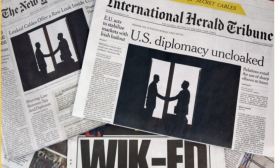wikileaks
As Arab regimes struggle with demonstrations fueled by Twitter and Al Jazeera, and U.S. diplomats try to understand the impact of WikiLeaks, it is clear that this global information age will require a more sophisticated understanding of how power works in world politics.

Welcome to the December/January issue of PDiN Monitor, CPD's electronic review of public diplomacy in the news. This issue focuses on the topic of WikiLeaks: America's Cablegate.
There has been much argument about what technologies and international factors played a role in Tunisia's revolution. We covered Facebook's role, which I would summarize as significant but not determinative.
It will probably take many years and even decades before the real lessons contained in these informative cables may be drawn. However, African governments and citizens should at least begin to reflect and learn preliminary but valuable lessons from the contents and the style of these informative cables.

PDiN Monitor Editorial Staff
Sherine B. Walton, Editor-in-Chief
Naomi Leight, Managing Editor
Marissa Cruz-Enriquez, Associate Editor
The internet alone won't set anyone free. Between north Africa and Belarus, we are learning just what it can and can't do...What contribution do websites, social networks and mobile phones make to popular protest movements? Is there any justification for labelling the Tunisian events, as some have done, a "Twitter Revolution" or a "WikiLeaks Revolution"?







